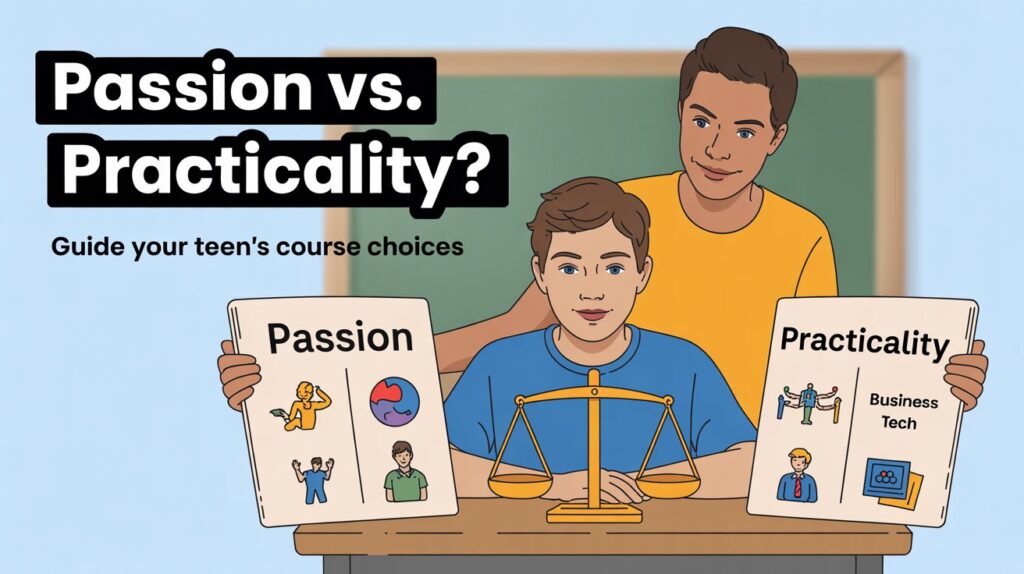Choosing the right courses during high school can be one of the most pivotal decisions a teen faces. Many students grapple with balancing their personal interests with the practicality of what courses will help them succeed in the future. The challenge lies in the fact that high school is a time for academic growth. It is an incredibly formative period for discovering one’s true passions. Parents play a crucial role in guiding their teens through this process and helping them understand how to make informed decisions about their academic journey.
Understanding Your Teen’s Interests
The first step in helping your teen navigate their course selections is to have an open conversation about their interests and aspirations. This requires creating a safe environment where your teen feels comfortable expressing what they truly enjoy doing, whether it be arts, sciences, or sports. Engaging them in discussions about their favorite subjects can often illuminate hidden passions. If your teen shows a deep interest in biology, that could manifest into a desire to pursue careers in medicine or environmental science. Recognizing these threads of passion can serve as a guiding star when analyzing the practicality of different course choices.
The Importance of Core Requirements
While it’s important for students to explore their interests, they must not overlook the importance of meeting core graduation requirements. Most high schools have a specific set of mandatory courses that students must complete to earn their diplomas. These often include subjects such as mathematics, literature, science, and social studies. Ignoring these requirements in favor of elective courses that may seem more exciting can hinder a student’s progression. As parents, it is vital to help your teen understand that core subjects do not have to be dull. Instead, various approaches and methodologies can make them engaging. Integrating real-world applications can turn a math class into an exploration of logical reasoning that relates directly to their interests, thereby enhancing their educational experience.
The Role of Guidance Counselors
It is important to utilize school resources, particularly guidance counselors, who can provide valuable insights into both passion and practicality. These professionals offer an objective perspective on course selection, ensuring that students weigh their interests against the realities of post-graduation plans. They can often point students to available courses that align with their interests and future aspirations. Students interested in the health sciences may benefit from taking courses like anatomy or psychology, offering a practical experience that complements their passion. Many counselors can recommend online summer courses for high schoolers, which allow students to explore new subjects during break. Such courses can pave the way for informed choices come the fall semester.
Exploring Electives and Extracurriculars
Once your teen has a grasp of the core requirements, it’s time to delve into elective courses and extracurricular activities. Electives offer students the freedom to choose classes that resonate with their passions. Whether it’s creative writing, environmental science, or advanced technology, these classes can ignite a passion that extends beyond the classroom. Extracurricular activities provide another avenue for exploration. Whether they choose to join the drama club, coding team, or a sports league, these experiences can help sharpen your teen’s interests and skills. For many students, participating in related activities can bolster their commitment to subjects they enjoy, leading to increased motivation during both elective and core courses.
Balancing Passion with Future Goals
Your teen’s course selection should be balanced with their long-term goals. As they get older, they may need to start thinking about where they would like to go after high school—whether they plan to attend college, enter the workforce, or take a gap year. Courses that align with their career ambitions can be incredibly beneficial during this phase. If your teen aspires to pursue a career in engineering, taking advanced mathematics and science courses will be significant. It’s also wise to encourage them to research potential college prerequisites for their desired fields. Understanding the academic path to their future professions can empower them to make more informed choices about the courses they select now.
Creating a Flexible Course Plan
Developing a flexible course plan is important, given that a teen’s interests and goals may evolve during high school. Annual reviews of their course selections and aspirations can help maintain a balance between passion and practicality. If your teen finds that they have developed a keen interest in environmental advocacy after taking a related class, pivoting to include more relevant courses or clubs can provide an enriched experience. Flexibility allows students to adapt their educational paths without losing sight of their core curriculum requirements. This can nurture a love for learning, encouraging them to embrace a dynamic approach to their education.
Encouraging Ownership Over Decisions
Parents need to encourage their teens to take ownership of their educational decisions. This includes being responsible for their course selections while still providing guidance. Supportive discussions can motivate teens to seek out classes that may not be the most popular among their peers but align with their interests. Allowing your teen to experiment with course choices fosters independence and helps them build confidence in their decision-making abilities. The critical point here is that the goal is to prepare students for academic success and to instill a sense of agency in their educational journey.
Choosing the right courses in high school is a balancing act that requires careful consideration of both passion and practicality. By engaging in open conversations about interests, utilizing available resources, and encouraging ownership over decisions, parents can help their teens navigate this important phase of their lives. In doing so, they can foster an educational environment that promotes academic excellence and a lifelong love for learning.



